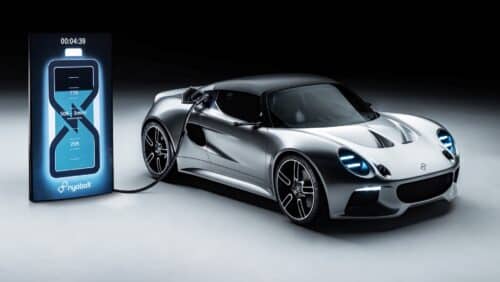Nyobolt, a startup, claims a notable breakthrough in battery technology that could facilitate electric vehicles (EVs) to recharge in less than 10 minutes.

Long charging times for electric vehicles (EVs) can pose challenges, including inconvenience for drivers and limited availability of charging stations. This can deter potential EV buyers and hinder the widespread adoption of electric vehicles as a practical alternative to traditional gasoline-powered cars. The current minimum time to recharge an EV largely depends on the charging infrastructure and the capabilities of the EV itself. With fast-charging technologies like DC fast charging, recharging an EV to approximately 80% capacity in around 30 minutes is possible.
Nyobolt, a startup based in the UK, asserts a significant advancement in battery technology, potentially enabling EVs to recharge in under 10 minutes. This breakthrough holds the promise of substantially reducing charging times and enhancing the convenience of EV usage.
The company claimed to achieve the advancement in battery technology and named it “holy grail”. This achievement allows electric vehicles (EVs) to achieve “full and repeated” charges in less than 6 minutes. The startup further declared its plan to produce this technology in 2024. Presently, EV charging takes considerably more time than refuelling with gasoline. By making charging as quick and effortless as pumping gas, range anxiety diminishes, allowing for smaller battery packs in EVs while ensuring convenience in everyday use.
In a collaborative effort, Nyobolt partnered with Callum, the design firm established by renowned automotive designer Ian Callum, to develop an electric sports car to showcase potential possibilities. As per a press release issued by the company, the EV boasts a weight closer to 2,200 pounds instead of 4,400 pounds, partly attributed to the utilisation of carbon-fibre bodywork. Additionally, it incorporates a relatively compact 35-kWh battery pack. According to the company’s claims, a 6-minute charge offers a range of 155 miles, resulting in an impressive 1,600 miles of range added per hour of charging.
The company refrained from disclosing any details about production plans for its sports car. The startup asserts its preparedness for a “rapid scale-up” of its battery technology. The startup has conducted extensive testing, including over 2,000 fast-charge cycles, demonstrating no significant performance degradation.






